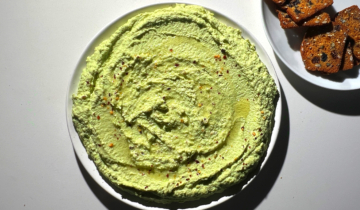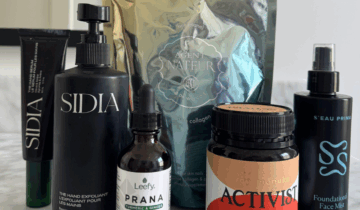Allergies can significantly impact the quality of life, especially during peak seasons when pollen, dust, and other allergens are rampant. Katherine Garbarino, the founder of Girls Living Well (GLW), emphasizes a holistic approach to wellness that includes natural remedies and lifestyle adjustments to manage and prevent allergies. Inspired by her advice and A.Vogel’s natural health product, Allergy Relief, let’s delve into effective strategies to keep allergies at bay.
Understanding Allergies
Every spring, Sarah’s family had a tradition of visiting the local farmers’ market. But for years now, Sarah dreaded these trips due to her severe hay fever. Her eyes would water, and she’d sneeze constantly, making it difficult to enjoy the outing.
Per the National Institute of Health, “Allergies occur when the immune system reacts to substances (allergens) that are usually harmless, such as pollen, dust mites, pet dander, or certain foods.” Common symptoms include sneezing, itching, nasal congestion, and watery eyes.1
Picture your body as a beautiful garden, with your immune system acting as the gardener. Weeds (allergens) can sometimes grow uncontrollably, disrupting the harmony of the garden. Natural remedies function as natural herbicides. They help the gardener selectively remove the weeds without harming the flowers, allowing the garden to thrive. This is how Allergy Relief works, helping to train the immune system and stop it from over-reacting to harmless pollens and allergens. This is unlike other allergy products that simply band-aid the problem.
Managing these symptoms often requires a combination of lifestyle adjustments, environmental controls, and natural remedies.
Natural Strategies for Allergy Prevention
- Diet and Nutrition:
- Anti-Inflammatory Foods: Incorporating anti-inflammatory foods into your diet can help reduce the body’s overall allergic response.
- Omega-3 Fatty Acids: Foods rich in omega-3 fatty acids, such as salmon, flaxseeds, chia seeds, and walnuts, can help reduce inflammation in the body.2,3 This, in turn, can alleviate allergy symptoms since inflammation is a core component of allergic reactions.
- Quercetin-Rich Foods: Quercetin is a natural flavonoid found in foods like apples, onions, and berries. It has anti-inflammatory and antihistamine properties, which can help reduce allergy symptoms.4,5
- Local Honey: Some believe that consuming local honey can help the body build tolerance to local pollen, though evidence is limited.6 It’s a harmless addition that could potentially help.
- Probiotics: Probiotics support gut health, which is crucial for a well-functioning immune system. A healthy gut can help regulate the body’s immune response, potentially reducing allergy symptoms.7 Foods rich in probiotics include yogurt, kefir, sauerkraut, kimchi, and other fermented products.
- Lifestyle Adjustments:
- Nasal Irrigation: Using a saline nasal spray or a neti pot can help flush out allergens from the nasal passages, reducing congestion and irritation. Regular nasal irrigation is a simple yet effective way to manage symptoms.8
- Eye Care: Many people experience itchy, red, and irritated eyes due to allergies. A.Vogel’s Eye Drops, formulated with Euphrasia (Eyebright) and hyaluronic acid, provide soothing relief for these symptoms. Eyebright is known for its anti-inflammatory and antimicrobial properties, which help reduce eye irritation caused by allergens. Hyaluronic acid helps maintain moisture and lubrication in the eyes, making these drops particularly beneficial for those who suffer from dryness and irritation. These eye drops are preservative-free and suitable for contact lens wearers, providing an easy-to-use and effective solution for managing allergy-related eye discomfort.
- Essential Oils: Diffusing essential oils like eucalyptus, peppermint, and lavender can help clear nasal passages and reduce symptoms.9 Garbarino often discusses the benefits of essential oils like those from Aromaforce, highlighting their role in promoting respiratory health.
- Environmental Controls:
- Air Purifiers: Investing in a good quality air purifier can significantly reduce indoor allergens. HEPA filters are particularly effective in trapping pollen, dust, and pet dander.
- Cleaning Routine: Regularly cleaning your home, especially bedding and carpets, can minimize dust mites and pet dander. GLW emphasizes the importance of a clean environment for overall wellness.
- Avoiding Outdoor Allergens: On high pollen days, keep windows closed and use air conditioning if possible. Showering and changing clothes after being outside can also help remove pollen and prevent it from spreading indoors.
Allergy Relief: A Natural Solution
A.Vogel’s Allergy Relief is a remedy designed to alleviate symptoms of hay fever and other allergic reactions. It contains natural ingredients like Luffa operculata, Galphimia glauca, and Cardiospermum, which are known for their allergy busting benefits.
Benefits:
- Non-Drowsy Formula: Unlike many over-the-counter antihistamines, Allergy Relief does not cause drowsiness, making it suitable for daytime use.
- Natural Ingredients: The remedy utilizes plant extracts that have been traditionally used to manage allergy symptoms.
- Versatile Use: It can be used to relieve symptoms of various allergies, including hay fever, pet allergies, and dust allergies.
Additional Tips
Stay Hydrated:
- Drinking plenty of water helps thin mucus, making it easier for your body to expel allergens. Staying hydrated is an easy way to support overall health and manage allergy symptoms.
Herbal Remedies:
- Other herbs, like butterbur and stinging nettle, have been traditionally used to treat allergy symptoms. Butterbur, in particular, has been shown to have effects similar to antihistamines but without the drowsy side effects.10 Always consult with a healthcare professional before starting any herbal remedies.
Healthy Lifestyle:
- Maintaining a healthy lifestyle through regular exercise, adequate sleep, and stress management can boost your immune system and help your body handle allergens more effectively. Stress reduction techniques such as yoga, meditation, and deep-breathing exercises can also be beneficial.
You can use code KGMTL20 for 20% off sitewide on https://shop.avogel.ca/
References
- Nur Husna, Siti Muhamad, et al. “Allergic rhinitis: a clinical and pathophysiological overview.” Frontiers in Medicine9 (2022): 874114.
- Ahmed, Nayyar, Colin J. Barrow, and Cenk Suphioglu. “Exploring the effects of omega-3 and omega-6 fatty acids on allergy using a HEK-blue cell line.” International Journal of Molecular Sciences2 (2016): 220.
- Wierenga, Kathryn A., and James J. Pestka. “Omega-3 Fatty Acids And Inflammation–You Are What You Eat!.” Frontiers for Young Minds9 (2021).
- Jafarinia, Morteza, et al. “Quercetin with the potential effect on allergic diseases.” Allergy, Asthma & Clinical Immunology16 (2020): 1-11.
- Yamada, S., et al. “Effects of repeated oral intake of a quercetin-containing supplement on allergic reaction: a randomized, placebo-controlled, double-blind parallel-group study.” European Review for Medical & Pharmacological Sciences12 (2022).
- Aw Yong, Poi Yi, et al. “The potential use of honey as a remedy for allergic diseases: a mini review.” Frontiers in Pharmacology11 (2021): 599080.
- Yang, Gui, Zhi-Qiang Liu, and Ping-Chang Yang. “Treatment of allergic rhinitis with probiotics: an alternative approach.” North American Journal of Medical Sciences8 (2013): 465.
- Abdullah, Baharudin, Chenthilnathan Periasamy, and Rushdan Ismail. “Nasal irrigation as treatment in sinonasal symptoms relief: a review of its efficacy and clinical applications.” Indian Journal of Otolaryngology and Head & Neck Surgery71 (2019): 1718-1726.
- Park, Nayoung, et al. “Protective effects of inhalation of essential oils from Mentha piperita leaf on tight junctions and inflammation in allergic rhinitis.” Frontiers in Allergy3 (2022): 1012183.
- Schapowal, Andreas. “Randomised controlled trial of butterbur and cetirizine for treating seasonal allergic rhinitis.” BMJ7330 (2002): 144.





 No products in the cart.
No products in the cart.